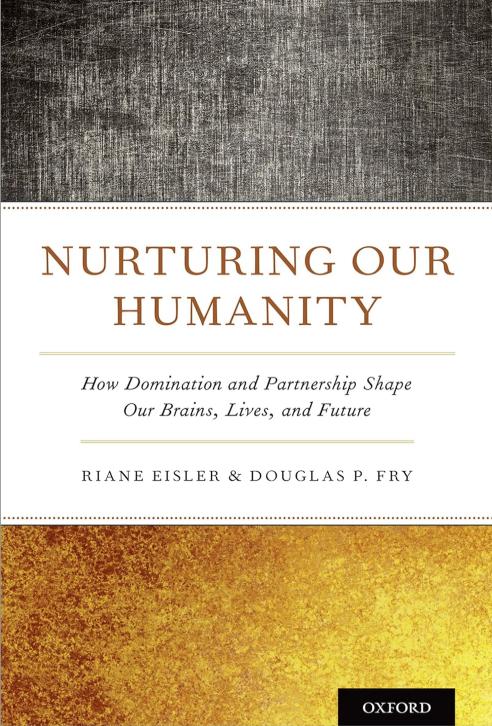| Nurturing Our Humanity |
 |
In this groundbreaking work, Eisler expands her influential cultural transformation theory by examining how social systems shape human development, behavior, and our collective future. The book presents a compelling framework analyzing societies through the lens of two fundamental models: domination systems versus partnership systems.
Domination systems are characterized by rigid hierarchies, authoritarian structures, and the normalization of violence. These societies emphasize control over others, whether through gender inequality, economic exploitation, or environmental destruction. In contrast, partnership systems prioritize mutual respect, gender equity, democratic processes, and sustainable practices. Eisler demonstrates how these contrasting models influence everything from child-rearing practices to economic policies.
A key contribution of the book is its interdisciplinary approach, combining neuroscience, anthropology, and psychology to show how early childhood experiences in different systems literally shape brain development. Harsh, punitive parenting in domination cultures creates neural pathways for aggression and fear, while nurturing care in partnership societies fosters empathy and cooperation. The authors present compelling evidence that our "human nature" is far more flexible than traditionally believed, shaped significantly by our cultural environment.
The work examines both historical examples (like egalitarian Neolithic societies) and contemporary case studies (such as Nordic nations with strong gender equality and social welfare systems). Eisler argues that transitioning to partnership systems is not just idealistic, but essential for addressing existential threats like climate change and nuclear war. The book concludes with practical pathways for change, emphasizing education reform, economic policies that value caregiving, and the transformation of gender narratives.
Nurturing Our Humanity ultimately presents an optimistic yet evidence-based vision for creating a more peaceful, sustainable future by consciously evolving our social systems toward the partnership model.
Nurturing Our Humanity
How Domination and Partnership Shape Our Brains, Lives, and Future
RIANE EISLER, JD, PHD (HON)
President, Center for Partnership Studies
DOUGLAS P. FRY, PHD
Professor & Chair
Department of Peace and Conflict Studies
University of North Carolina at Greensboro
Acknowledgments
1. Our Story … 1
2. Evolution, Ideology, and Human Nature … 6
3. Love, the Brain, and Becoming Human … 14
4. The Biology of Experience … 23
5. The Benefits of Partnership and the Costs of Domination … 31
6. Two Alternate Social Possibilities … 37
7. The Original Partnership Societies … 41
8. Contracting or Expanding Consciousness … 50
9. Touch, Intimacy, and Sexuality in Partnership and Domination Environments … 55
10. Love, Violence, and Socialization in Partnership and Domination Environments … 63
11. The Real Culture Wars … 71
12. A New Beginning … 78
Bibliography
Many people have contributed to this book, which has gone through a number of iterations. Earlier manuscript drafts were strengthened through reviews by biologist Mary E. Clark and psychologist/primatologist Frans de Waal and by the dedicated editing of Helen Knode. Science writer Sharon Begley was also of help, as were psychologist Daniel S. Levine, primatologist Barbara Smuts, anthropologists Stuart Schlegel and Peggy Sanday, neuroscientist Lucy R. Brown, social psychologist David Loye, as well as Melissa Stone, Loren Alison, and Andrea Eisler. We express our gratitude to all of them.
We next want to give our thanks to the many contributions made to the final version of the book by neuroscientist C. Sue Carter, anthropologist Kirk Endicott, psychologist Sheina Lew-Levy, anthropologist Paul “Jim” Roscoe, primatologist/neuroscientist Robert Sapolsky, and peace and global ethics scholar Geneviève Souillac. We also want to thank Loren Alison, Julia Alison, Ann Amberg, Michelle Bird, Frances Collins, Leah Gowron, Carla Goldstein, Kacey Keith, Matt Lett, Brie Mathers, Sara and Manfred Melchior, Sara Saltee, and Claire Souillac.
Our editor at Oxford University Press, Joan Bossert, merits our special thanks, as do Phil Velinov, Jennifer Rod, and Ayshwarya Ramakrishnan.
We would like to acknowledge the collaboration and creative synergy between us as joint authors of this book. It has truly been a pleasure working together, and we have each learned a great deal in the process.
Last, but certainly not least, we want to thank our spouses for their wonderful support and great patience with us during the writing of this book. Riane’s partner David Loye has been an invaluable source of care, insight, and knowledge, and so also has Doug’s partner Geneviève Souillac. They continue to inspire us.
Riane Eisler and Douglas P. Fry April 2019
Oxford University Press
Oxford University Press is a department of the University of Oxford. It furthers the University’s objective of excellence in research, scholarship, and education by publishing worldwide. Oxford is a registered trade mark of Oxford University Press in the UK and certain other countries.
Published in the United States of America by Oxford University Press 198 Madison Avenue, New York, NY 10016, United States of America.
© Oxford University Press 2019
All rights reserved. No part of this publication may be reproduced, stored in a retrieval system, or transmitted, in any form or by any means, without the prior permission in writing of Oxford University Press, or as expressly permitted by law, by license, or under terms agreed with the appropriate reproduction rights organization. Inquiries concerning reproduction outside the scope of the above should be sent to the Rights Department, Oxford University Press, at the address above.
You must not circulate this work in any other form and you must impose this same condition on any acquirer.
Library of Congress Cataloging-in-Publication Data
Names: Eisler, Riane, author. | Fry, Douglas P., 1953– author.
Title: Nurturing our humanity : how domination and partnership shape our brains, lives, and future / Riane Eisler and Douglas P. Fry.
Description: New York : Oxford University Press, [2019] | Includes bibliographical references and index.
Identifiers: LCCN 2018061070 | ISBN 9780190935726 | eISBN 9780190935740 Subjects: LCSH: Interpersonal relations. | Dominance (Psychology) | Partnership—Psychological aspects. | Human evolution. Classification: LCC HM1111.E37 2019 | DDC 302—dc23 LC record available at https://lccn.loc.gov/2018061070